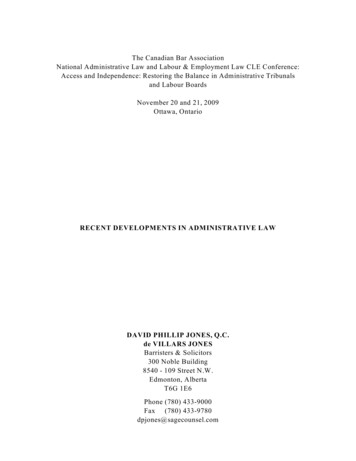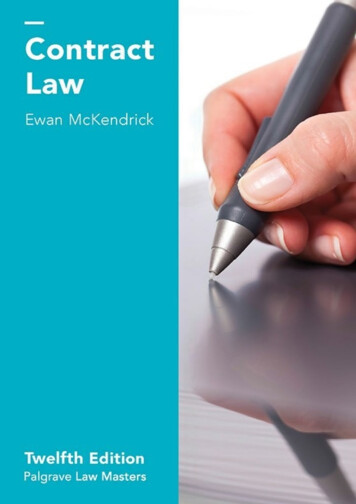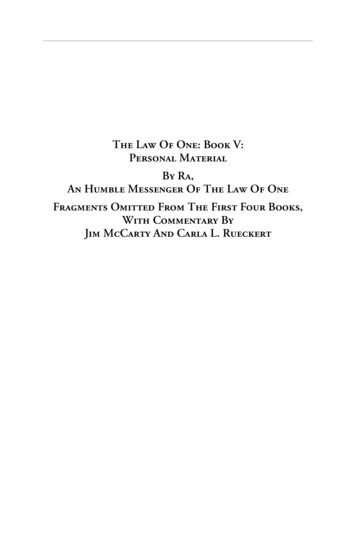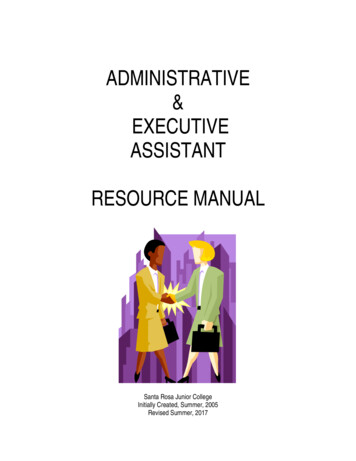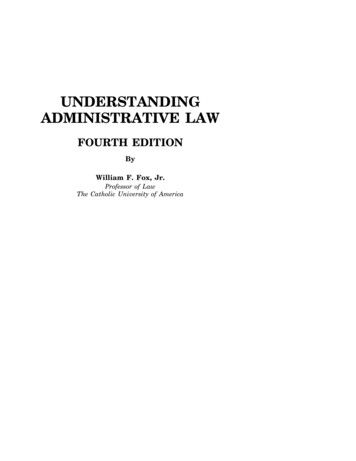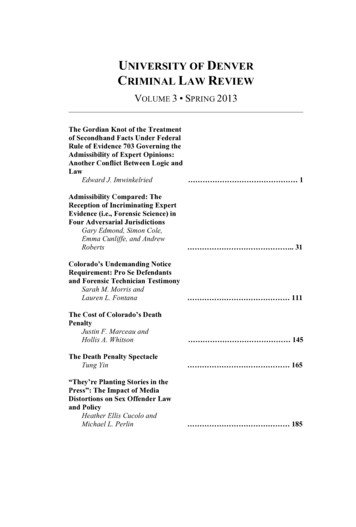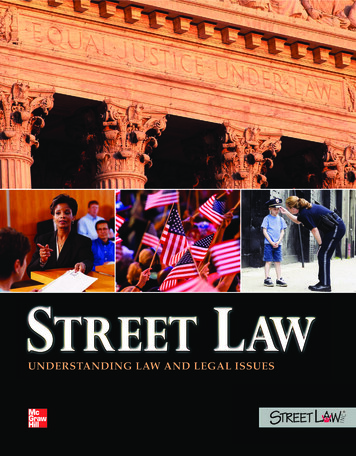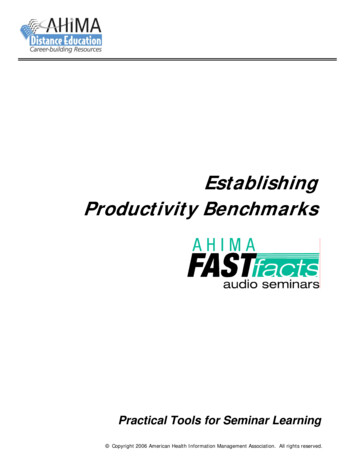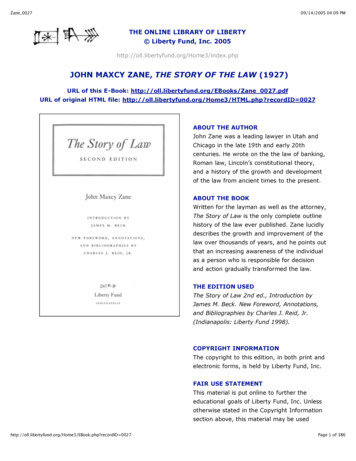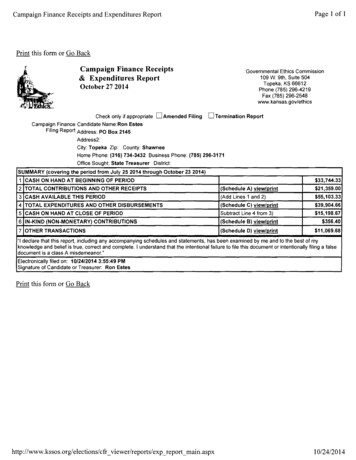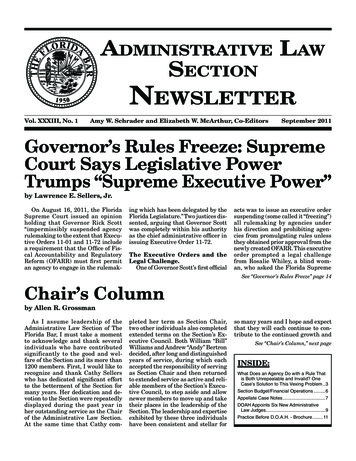
Transcription
Administrative LawSectionNewsletterVol. XXXIII, No. 1Amy W. Schrader and Elizabeth W. McArthur, Co-EditorsSeptember 2011Governor’s Rules Freeze: SupremeCourt Says Legislative PowerTrumps “Supreme Executive Power”by Lawrence E. Sellers, Jr.On August 16, 2011, the FloridaSupreme Court issued an opinionholding that Governor Rick Scott“impermissibly suspended agencyrulemaking to the extent that Executive Orders 11-01 and 11-72 includea requirement that the Office of Fiscal Accountability and RegulatoryReform (OFARR) must first permitan agency to engage in the rulemak-ing which has been delegated by theFlorida Legislature.” Two justices dissented, arguing that Governor Scottwas completely within his authorityas the chief administrative officer inissuing Executive Order 11-72.The Executive Orders and theLegal Challenge.One of Governor Scott’s first officialacts was to issue an executive ordersuspending (some called it “freezing”)all rulemaking by agencies underhis direction and prohibiting agencies from promulgating rules unlessthey obtained prior approval from thenewly created OFARR. This executiveorder prompted a legal challengefrom Rosalie Whiley, a blind woman, who asked the Florida SupremeSee “Governor’s Rules Freeze” page 14Chair’s Columnby Allen R. GrossmanAs I assume leadership of theAdministrative Law Section of TheFlorida Bar, I must take a momentto acknowledge and thank severalindividuals who have contributedsignificantly to the good and welfare of the Section and its more than1200 members. First, I would like torecognize and thank Cathy Sellerswho has dedicated significant effortto the betterment of the Section formany years. Her dedication and devotion to the Section were repeatedlydisplayed during the past year inher outstanding service as the Chairof the Administrative Law Section.At the same time that Cathy com-pleted her term as Section Chair,two other individuals also completedextended terms on the Section’s Executive Council. Both William “Bill”Williams and Andrew “Andy” Bertrondecided, after long and distinguishedyears of service, during which eachaccepted the responsibility of servingas Section Chair and then returnedto extended service as active and reliable members of the Section’s Executive Council, to step aside and allownewer members to move up and taketheir places in the leadership of theSection. The leadership and expertiseexhibited by these three individualshave been consistent and stellar forso many years and I hope and expectthat they will each continue to contribute to the continued growth andSee “Chair’s Column,” next pageINSIDE:What Does an Agency Do with a Rule Thatis Both Unrepealable and Invalid? OneCase’s Solution to This Vexing Problem.3Section Budget/Financial Operations.6Appellate Case Notes.7DOAH Appoints Six New AdministrativeLaw Judges.9Practice Before D.O.A.H. - Brochure. 11
Administrative Law Section NewsletterChair’s columnfrom page 1productivity of the Section as we turnto the next page and move forward.The current environment in Florida has created a sea of unrest inthe usually rather placid waters inwhich administrative law practitioners have historically plied our trade.The recently concluded legislativesession directed significant attentionto administrative law issues and theissues were so robust and volatilethat the proverbial dust is still settling. The new Governor has showna determination to change the existing norms and practices involved inexercising the duties of state government. His broad and somewhat extreme reconfiguring of state government processes has been intended toalter the fundamental and historicpremises of government action andhas created new realities requiringintervention by the Courts to protectthe integrity of the distinct branchesof government and the constitutionalexercise of authority on behalf of thecitizens of Florida. This Governorhas indicated that he intends to takefurther steps to change the mannerin which state government operatesFloridaBarMasterCardVolume XXXIII, No. 1 September 2011and such steps are very likely to havea dramatic impact on how the administrative process in Florida works.It appears that we are enteringinto one of those periodic momentsin time when it is quite likely thatwe will be able to look back and recognize that we experienced a pivotalinstance influencing the course of ourstate’s future and the future of thebody of law that is so integral to ourpractice as administrative lawyersin Florida. It is my hope that we canposition our Section to continue tobe a conduit of administrative lawexpertise to those who are going toplay a significant role in determiningthe direction and course of Florida’sprogress. Obviously, the ability toshare such expertise depends completely on the depth and breadth ofthe expertise of the Section’s membership. I hope that you will considereither joining the Section if you arenot currently a member or, if you arealready a member, increasing yourparticipation in the activities andprograms the Section offers. We arealways in need of the new personalities and the new energy that willcontribute to the consistent success ofour continuing education programs,law school outreach programs, legislative endeavors, efforts to advise andconsult on substantive legislative andlegal issues, and even the leadershipand administration of the Section.Please take the time to visit theSection’s website and take a look atwhat the Section has been doing. I amsure that if you choose to make thecommitment to actively participatein the programs and activities sponsored by the Administrative Law Section, you will discover and experiencethe significant benefits that such participation can bring. We are alwayslooking to embrace new members andnew ideas and I have no doubt thatyour participation will contributesignificantly to the enhancement ofour mission and goals.Here is to a good year and an activeyear for the Administrative Law Section of The Florida Bar and all of ourmembers. Come join us as we striveto raise awareness of the principlesand issues inherent in the practice ofadministrative law; strive to contribute to the professional enhancementof all those who practice in our field;and strive to make sure that those inauthority make Florida a better placefor all of its citizens. I look forward toseeing you during the year and hearing from you if there is anything thatyou believe the Section can or shouldbe doing.Managing your day to day expenses can be challenging when you own your own firm.The Florida Bar, in conjunction with Bank of America, is offering loyal members a businesscredit card to help manage those expenses. The Florida Bar Business Credit Card withWorldPoints Rewards gives you the reassurance of knowing that whenever you need tomake a purchase for your business you have the flexibility to do so. You can even get a cardfor each member of your team, if you’d like, at no extra charge.Whether you are purchasing supplies for the office or tickets for a business trip, theWorldPoints Business Credit Card gives you the ease of tracking all purchases. You will receivemonthly statements in the mail, and you can go online to run reports as well anddownload your transactions right into your financial management software such asQuicken or QuickBooks. Bank of America also has specialized representatives toassist you 24 hours a day 7 days a week with your account.Rest assured your accounts are protected; there is protection for fraudulentcharges and employee misuse insurance on all your credit cards. The Florida BarBusiness Card with WorldPoints Rewards works for you, earning points thatyou can redeem for gift certificates, cash, travel, or merchandise.Call 1-888-895-4904 and mention priority codeUABGAH to apply or go to www.floridabar.org to applyfor your card today.Credit card is issued and administered by FIA Card Services, N.A. Normal credit standards apply.WorldPoints is a registered trademark of FIA Card Services, N.A.2
Volume XXXIII, No. 1 September 2011Administrative Law Section NewsletterWhat Does an Agency Do with aRule That is Both Unrepealableand Invalid? One Case’s Solutionto This Vexing Problemby Richard J. ShoopThe case of Broward Children’sCenter, Inc. v. Plantation Nursingand Rehabilitation Center, 66 So. 3d1063 (Fla. 1st DCA 2011)1, concernsan interesting scenario whereby anagency confronted with a challengeto a rule that it believed was invalidyet was unable to repeal concededthe rule’s invalidity. A third partythen attempted to intervene in therule challenge only to find itselfalone in defending the validity ofthe rule. This article will give somebackground information on the caseand subsequent appeal along withdiscussing the implications of theopinion and whether there could beother avenues for achieving the sameresult.BackgroundPlantation Nursing and Rehabilitation Center (“Plantation”) isa 152-bed nursing home located inBroward County, Florida.2 Plantationwas looking to expand its pediatricprogram but was unable to do sobecause of the limitations found inRule 59A-4.1295(7)(e), Florida Administrative Code (“the rule”), whichstates:(7) For those nursing facilities whoadmit children age 0 through 15years of age the following standardsapply in addition to those above andthroughout Chapter 59A-4, F.A.C.***(e) The facility shall be equippedand staffed to accommodate nomore than sixty (60) children atany given time, of which there shallbe no more than 40 children of ages0 through 15 at any given time, normore than 40 children of ages 16through 20 at any given time.Plantation first tried to obtain a waiver of the rule by filing a petition forwaiver with the Agency for HealthCare Administration (AHCA), butAHCA denied the petition.3 Next, itfiled a Petition for Determinationof Invalidity of Existing Rule (“RuleChallenge Petition”) with the Division of Administrative Hearings(DOAH).In the Rule Challenge Petition,Plantation alleged the rule was invalid because: 1) the agency exceededits grant of rulemaking authority; 2)the rule enlarged, modified or contravened the law it implemented; and 3)the rule was arbitrary or capricious.4AHCA declined to defend the rule.Instead, it filed a response to the RuleChallenge Petition stating it agreedthere was no statutory authority forthe bed cap in the rule and, therefore,the rule was invalid.5 AHCA, however, objected to Plantation’s requestfor attorney’s fees and costs becauseit had acted in good faith.6 The dayafter AHCA filed its response, Plantation filed a Motion for Summary FinalOrder in which it requested that theadministrative law judge (“ALJ”) enter a summary final order concludingthe rule was an invalid exercise ofdelegated legislative authority basedupon AHCA’s response to its RuleChallenge Petition.7 Plantation alsoagreed to waive its right to attorney’sfees and costs.8 It appeared at thatpoint that the case would quickly beresolved.However, one day after Plantationfiled its Motion for Summary FinalOrder, Broward Children’s Center,Inc. (“BCC”) filed a Petition for Leaveto Intervene in the rule challenge. Inthe Petition for Leave to Intervene,BCC alleged that it had standing tointervene in the matter because itwas “the only free standing skillednursing facility for children requiring sophisticated medical treatmentin the Southeast United States” andwould be “immediately and substantially affected if Plantation’s challenge [was] successful.”9 It defendedthe validity of the rule by stating that“[i]t is entirely reasonable, appropriate and within the Agency’s delegatedlegislative authority to place a limiton the size of a skilled nursing facility,or unit of a facility, where children reside for skilled nursing home care.”10As evidenced by its Petition for Leaveto Intervene, BCC’s primary motivewas financial. Indeed, a victory byPlantation would place BCC—a muchsmaller, specialty facility—in directcompetition with Plantation for patients. But, was financial harm aloneenough for BCC to establish standing? And, if so, could BCC defend thevalidity of the rule by itself when bothAHCA and Plantation had agreedthat it was invalid?AHCA and Plantation arguedthat the answer to the first question was “no.” As Plantation pointedout in its Motion to Dismiss, BCC’salleged injury was speculative andconjectural at best.11 Furthermore,because BCC’s desire to intervenein the proceeding was based solelyon protecting its market share, BCCdid not have standing to intervene inthe matter.12 AHCA and Plantation,however, did not specifically addressthe second question in their motionsto dismiss. BCC responded to themotions by asserting that economicinterests were sufficient to establishstanding to intervene and again defended the validity of the rule.13The ALJ entered a Summary Finalcontinued.3
Administrative Law Section NewsletterVexing problemfrom page 3Order, agreeing with both AHCA andPlantation that the rule was invalid.In doing so, the ALJ noted that[t]his case is in an unusual, if notunique, procedural posture. That is,[AHCA] agrees with [Plantation]that the challenged Rule is invalid,and asserts that it has been tryingto repeal this Rule. [BCC] seeks tointervene into this case to defendthe validity of the Rule. However, itfinds itself with no party with whichto align, as neither party believesthe Rule is valid.14First, the ALJ addressed the issueof the rule’s validity by concludingthat the statute the rule claimed toimplement did not contain any language setting a bed limit for pediatric patients in a particular facility.15Thus, the rule exceeded AHCA’s specific grant of rulemaking authority.16Then, the ALJ turned to the issue ofintervention, stating that “[a] fundamental characteristic of interventionis that it is subordinate to and in recognition of the propriety of the mainproceeding.”17 Because neither AHCAnor Plantation was defending the validity of the rule, the ALJ concludedthat it could not grant BCC’s requestfor intervention without inappropriately elevating BCC to the status ofa principal party to the litigation.18The ALJ based her ruling, in part,on the case of Humana of Florida,Inc. v. Department of Health and Rehabilitative Services, 500 So. 2d 186(Fla. 1st DCA 1986). In Humana, aparty had filed a petition for formalhearing to contest the Department ofHealth and Rehabilitative Services’(HRS) preliminary approval of a certificate of need application.19 Humanafiled a petition to intervene in theproceeding, which was granted bythe hearing officer.20 Thereafter, theparty that had filed the petition forformal hearing voluntarily dismissedthe petition and the hearing officerclosed the case at DOAH.21 HRS thenentered a final order concluding thatthe party had an absolute right todismiss its petition for hearing, andVolume XXXIII, No. 1 September 2011such dismissal effectively ended theproceeding.22 In affirming HRS’ finalorder, the First District Court of Appeal held that Humana had joinedthe proceeding subject to the originalpetitioner’s action, and that, when thepetitioner had dismissed its petition,there was no longer a valid proceeding in which Humana could participate.23 According to the court, “[t]ohold otherwise would be to vest in theintervenor greater status than theoriginal petitioner.”24 BCC disagreedwith the ALJ’s ruling in the summaryfinal order and appealed to the FirstDistrict Court of Appeal.The First District Court of Appealaffirmed the ALJ’s summary final order. It concluded that “[t]he ALJ correctly reasoned that intervention wasinappropriate in this case becauseAppellant, who wished to defend therule’s validity and who could not bealigned with either party, would beimproperly elevated to the status ofa principal party if intervention werepermitted.”25 The court reasoned that“[i]ntervention is a dependent remedyin the sense that an intervenor maynot inject a new issue into a case, andthe rights of an intervenor are conditional in that they exist only as longas the litigation continues betweenthe parties.” 26 Thus, because bothAHCA and Plantation had agreed therule was invalid, the “litigation” hadended and BCC’s defense of the rule’svalidity was a “new issue.” If BCChad been granted leave to interveneit would be a “principal party” to thecase at that point. The court alsonoted that AHCA “is afforded widediscretion in interpreting a statutewhich it is given the power and dutyto administer,” and that the ALJ “wasmindful of this discretion when rulingthat the rule was invalid.”27 Thus, according to the court, the ALJ properlydenied BCC’s Petition for Leave to Intervene under the facts of the case.28Is an Agency’s Concession thata Rule is Invalid a Violation ofChapter 120?While the Plantation case decidedthe issue of whether BCC had standing to intervene, the decision raisesan additional question that was notaddressed: Does an agency violatesection 120.54, Florida Statutes, byagreeing that a rule is invalid? After4all, section 120.54(3)(a), Florida Statutes, mandates that:Prior to the adoption, amendment,or repeal of any rule other than anemergency rule, an agency, uponapproval of the agency head, shallgive notice of its intended action,setting forth a short, plain explanation of the purpose and effect of theproposed action; the full text of theproposed rule or amendment and asummary thereof; a reference to thegrant of rulemaking authority pursuant to which the rule is adopted;and a reference to the section orsubsection of the Florida Statutesor the Laws of Florida being implemented or interpreted.(Emphasis added). Indeed, BCC implied in its pleadings that AHCA violated Chapter 120, Florida Statutes,and thus engaged in a “backdoor rulerepeal” during its appeal.While the court’s opinion does notdirectly address this question, it doesmake pointed mention of the fact thatAHCA had made two unsuccessful attempts to repeal the rule previously(note: it is not clear why AHCA wasunsuccessful in its attempted repealor what AHCA’s reasons were forattempting the repeal). Perhaps thecourt thought the fact that AHCAfirst tried to repeal the rule, coupledwith the fact that the ALJ found therule to be invalid, weighed heavilyagainst this case being a “backdoorrule repeal.” Or perhaps, the courtconcluded that, as a practical matter,an agency cannot be made to defend arule it believes is invalid regardless ofthe requirements of section 120.54(3).In theory, the “backdoor rule repeal” scenario could happen. Anagency could find a “straw man” tochallenge the validity of a rule itwished to repeal and then not opposea motion for summary final order.Presuming the motion raises an adequate basis for invalidation, the ALJcould enter a summary final ordergranting the motion and renderingthe rule invalid. Voilá! The rule iseliminated in a much shorter periodof time than it would take to pursue arepeal of the rule under Chapter 120,Florida Statutes. In this way, agencies could effectively circumvent theprocedures set forth in section 120.54,Florida Statutes.
Volume XXXIII, No. 1 September 2011There are, however, some majorflaws with this theoretical scenario.First, there are likely only a few existing rules that are both unrepealableusing the process set forth in section120.54, Florida Statutes, and invalid.Second, an agency would have tolocate a “straw man” with standingto challenge the validity of the rule.Depending on the rule, the pool of“straw man” applicants availablecould be quite shallow. (Note that, inPlantation, AHCA did not go lookingfor a “straw man.” Plantation initiated the proceeding on its own. AHCAmerely conceded the invalidity of therule once the proceeding had beguninstead of defending it.) Finally, andperhaps most importantly, it is anALJ who makes the final determination on a rule’s validity, even ifthere were such collaboration by theparties.The Plantation case also raisessome speculation as to whether theremight be other avenues for dealin
Business Card with WorldPoints Rewards works for you, earning points that you can redeem for gift certificates, cash, travel, or merchandise. Call 1-888-895-4904 and mention priority code UABGAH to apply
